#Meta Quest+
Explore tagged Tumblr posts
Text
Meta Quest+ 二月精選:《I Expect You To Die》與《DYSCHRONIA: Chronos Alternate》
隨著二月份的到來,Meta Quest +再次為虛擬實境愛好者帶來了兩款精選遊戲:《I Expect You To Die》和《DYSCHRONIA: Chronos Alternate》。這兩款遊戲各自展現了VR遊戲設計的創新和多樣性,提供了深入的敘事體驗和引人入勝的遊戲機制。 《I Expect You To Die》— 智力解謎的間諜冒險 類型: 解謎、冒險 開發商: Schell Games 《I Expect You To…
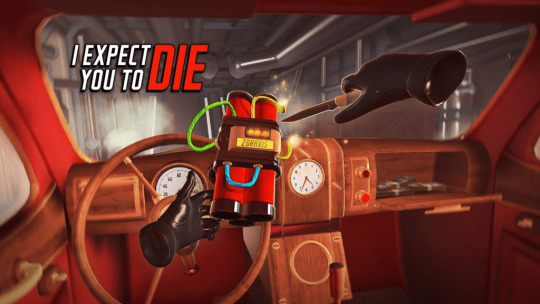
View On WordPress
#DYSCHRONIA: Chronos Alternate#虛擬實境#虛擬實境遊戲#虛擬實境資訊#虛擬實境新聞#I Expect You To Die#META#Meta Quest+#Quest 3#vr#vr game#vr news#vr news today
3 notes
·
View notes
Text

liesel 🙂👍
#xenoblade#xenobladechronicles#xenoblade fanart#xenobladex#xcxde#xenoblade chronicles x#liesel xenoblade#in case anyone is inclined to write ch13 spoilers in response to this: dont please im not done yet#my funny personal meta with liesel is b4 the game came out (mind you im off twitter so i saw very little of the promotional stuff pre-#-release) i was talking to my friends abt who we wanted our crosses to be and i was like ok. heres my idea#lesbian former air force skell pilot who's pretty well renowned for piloting skills#then i did liesels quest and i was like ok.#my art
259 notes
·
View notes
Text
I love so much that it is apparently canon that Hans fails in seducing Karolina in the DLC The Amorous Adventures of Bold Sir Hans Capon:


Henry even admits to it! That he was (very likely intentionally) feeding him the wrong verses, most likely because he was already sweet on Hans at this point
We know Henry to usually be a very capable guy who knows how to read. Why else would he feed Hans the wrong verses?
#hansry#hans capon#henry of skalitz#kingdom come deliverance#kcd meta#kcd#kcd2 spoilers#tbh it's kind of implied imo that he already liked hans then#because it's the same quest where henry is like oh you're as dashing as ever!#and confirms this in his notes#which tells us that he was not lying!
272 notes
·
View notes
Text
if you want to understand why i say veilguard is extremely tightly written and full of parallels, fractals, and foils which zero in on the themes of generational trauma, grief, and escaping cycles, look no further than the pre-title screen tutorial:
not only is it nearly beat for beat the inquisition pre-title tutorial (cutscene to establish the protag's personality, meet the "advisors", a giant hole in the sky spewing demons, gather your first companions, fight through a demon infested landscape to reach a temple where a ritual is/was being enacted that would destroy the world, first big boss is a pride demon)
but right there, in the first ~thirty minutes of the game, rook becomes solas the rebel wolf and solas becomes elgar'nan the cruel. solas stabs varric (like mythal was stabbed by elgar'nan) after varric only tried to talk to solas, to reason with him, as mythal tried to reason with elgar'nan.
not for nothing is rook varric's second as solas was once mythal's. and not for nothing does solas keep the full realization from rook.
#veilguard spoilers#datv spoilers#veilguard positive#no way this isn't setting the stage for my shadows=solas' rebellion but better meta#no sir not all#everything in this game harmonizes kids#literally everything#some things more than others#yes even taash's rivani or qun identity quest can be seen as a fractal foil to solas' own identity quest as spirit/ancient elf
380 notes
·
View notes
Text
mentally I'm still here:

Nico insisting that neither of them are going to be sacrificed/left behind to satisfy the prophecy is a perfect encapsulation of his growth over the series and it makes me SO soft to think about
Nico as a character - particularly in BoO - doesn't have a lot of self-preservation. He doesn't really care what happens to him as long as the mission gets done. We see this most explicitly after he almost fades into nothingness after the Bryce Lawrence incident:

And again when he considers shadow travelling into Octavian's tent to assassinate him:
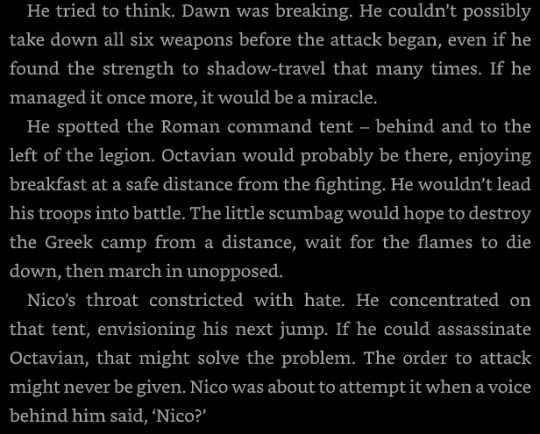
(Nico himself notes here that it was unlikely he would survive another jump. If Will hadn't stopped him, he probably would have died.)
In both cases, Nico was willing to risk death for the sake of ending the war. He puts very little value on his own life, and repeatedly argues to Reyna, Hedge, and Will that the possibility of saving camp (a place he never felt welcome at, might I add) is worth the risk of losing his life.
Even before Nico went on the quest with Reyna and Hedge, the others were concerned about his safety. Percy tried to remind him how unpredictable his shadow travelling could be, and Hazel notes that he has been acting strangely lately:

It's not quite clear what Hazel is worried about here, but my interpretation of this scene is that she's concerned that Nico isn't thinking - or perhaps, isn't caring - about what effect the constant shadow travelling will have on his wellbeing. Between Tartarus, the jar, and the Cupid incident, Nico's mental state is at its worst at this point in the series, and I think Hazel is worried he'll do something reckless - something he can't come back from.
And so in TSATS, when Nico is told that he's going to have to leave something of equal value behind in order to save Bob, the old him would have had zero issue sacrificing himself if that's what it took to ensure Will and Bob's survival. This version of Nico, who's been going to therapy w/ Mr D and opening up more and built a little support system for himself, can't fathom it.
Nico in BoO did not have a future. He had fully convinced himself that nobody cared about him or would miss him if he was gone - not Percy who fought for him at every turn in PJO, not his sister Hazel, not his new friends Jason and Reyna. He was ready to leave both camps behind because he couldn't see himself ever being happy there. He couldn't see himself being happy at all.

But now, in TSATS, he has a boyfriend that he loves, he has friends that he loves, and he has a community in Camp Half-Blood. He has experienced so much loss that losing someone else is his worst fear. The old Nico would have considered sacrificing himself to protect Will and Bob. At the very least, he would have kept that option in his back pocket as a 'just in case'; he wouldn't have sworn on the Styx that he wouldn't stay behind.
This Nico, however, is doing much better - not perfect, but better. He loves Will, and he wants a life with him, and he's not willing to give that up for anything. Nico has hope for the future, and he's clinging to that hope with everything he has. He sees a light at the end of the tunnel, and he wants to reach it. He's not willing to sacrifice himself because it means losing that future.
Gone is the cynical pessimistic Nico who assumes the worst because the worst is all he thinks he can have. Here is the Nico who has had a taste of happiness and is willing to fight to keep it. He's not going to sacrifice himself because he wants to live. He's not just fighting for Will here; he's fighting for himself too.
And seeing him go from "if it kills me, it kills me" to "it's not going to be me" makes me so ASDFGHJKL
#nico di angelo#solangelo#tsats#meta#mine#some points of clarification I want to make here in the tags:#1) I don't think that Nico /wanted/ to die necessarily; only that he didn't care if he lived or died#2) I'm not arguing that getting a boyfriend 'fixed' nico#I don't think he ever would have been open to trying something with Will if he hadn't befriended Jason and Reyna first#ALSO i would argue that Nico's story from as early as BOTL has been about recovering and getting better and moving forward#he has been on this journey loooong before Will had ever entered the picture#his relationship with Will is not the reason he got better; it's the result of Nico choosing to get better on his own accord#because the pre-statue quest Nico would have never allowed himself to get close to another person
698 notes
·
View notes
Text
There's a fascinating aspect of Ellen's character that I've seen some people touch on before, but now that it got into my head I need to go through to it too-- her nature not being of human kind. It's actually one of the very first things Orlok himself says: that Ellen is not human, and he reasserts it later. But then what is she?
"Almost a sylph," Knock says of Ellen. "His little changeling girl," Ellen says her father had described her as, when she wandered off into the forest as a child. "You mustn't be caught up in her fairy ways," Harding admonishes Anna. Hell, in the 2016 script, when the Hardings accompany Ellen on her walk along the sea shore, she and the children dance in a circle while Ellen cries out "round and round the fairy ring". Furthermore, there's more than one explicit reference to Ellen loving the sea in the scripts. Prior to the sea shore walk, Ellen fervently asks Anna to go there, because "it calms her". Later on, Anna herself says that "she loves the sea so". While this didn't make it to the movie in such direct terms, we still see Ellen looking out windows and yearning, again and again... visiting the sea twice, having a seizure in the water itself. "Look at the sky! Look at the sea! Does it never call to you? Urge you?" she cries to Anna.
It's clearly an intentional implication on Eggers' part: that Ellen is some kind of fairy-like nature elemental. The term sylph originates from the works of Paracelsus, and described as a female air spirit, though over time water has been conflated with it too. Changeling also refers to a child kidnapped by supernatural beings (interestingly birthed by the Devil or a water spirit among others, in German mythology) and replaced with... something else. And we could leave it at that-- Ellen is not entirely human. She was born with witchy and fae-like characteristics, an attraction to the wind and the sea.
When she called out in the dark, it's possible Orlok answered also because he recognized this within her. But. There is a type of female nature spirit in Romanian folklore (which ultimately pervades the mythology of Nosferatu) that has specific parallels and a particular relationship to the Solomonar, the kind of sorcerer/supernatural creature Orlok was in life. It feeds into the overarching theme of destiny and fate so beautifully. I find it all very interesting, but I got pretty long already, so I'll put the rest under the cut.
Female nature spirits can be found all over the place in European folklore, and Romania is no different. They can have many names, though the most popular one is probably iele, a name that is literally derived from the female plural "ele". Iele are fae-like feminine spirits associated with the winds and the sky, often seducing and luring men away. What attracted my attention though, is the variation/subtype of vântoase (root word vânt = wind) or the associated vâlvă. In some accounts [1], this supernatural creature is a marked human who was born with the capacity for their spirit to leave their body at night and then go towards the sky, where they wrestle with other vâlve or balauri (which are a Romanian mythical equivalent of dragons, alongside zmei). Their fights are said to be what cause storms, and rains, and other catastrophe-related weather events. When put in contrast with Ellen, the similarities are obvious... especially when it comes to her affinity for nature and her spirit "wandering off". It also must be emphasized that these spirits are not inherently evil: they can do both good and bad, bring luck or misfortune, aligning with Ellen saying that "her spirit cannot be as evil as his [Orlok's]" and that all her life she has "simply heeded her own nature".
But the thing is... a marked human born with powers is also what a Solomonar is: children able to control the weather, ride balauri or zmei, control and turn into different animals-- who are then recruited by the Devil into the school of Șolomanță/Scholomance. Although despite this demonic current association, initially Solomonari were also more of a neutral figure in Romanian folklore. They are theorized, among other hypotheses, to be a later version of Geto-Dacian ktistai, who were selected from priests or kings (Orlok is a count, a prince or voivode) and might've worshipped Zamolxe, a Geto-Dacian God associated with the sky as well as immortality (Ancient Dacian is what Orlok speaks; Zamolxe is written within Orlok's heptagram sigil; on his coat of arms, sigil and coffin there's Dacian wolves as well as balauri-- a serpent-like creature with the head of a wolf which is on the Dacian flag). Some Solomonari were believed to be protecting villages from calamity, and influenced the weather in order to grow crops more easily. But of course, when Christianity spread in the region, things from Pagan times began to be associated with the Devil, hence why the Christian Orthodox Abbess we see in the Nosferatu movie calls Orlok a "black enchanter". More importantly for us though, the Solomonar was also said to leave their body at night in a trance, riding up into the sky to fight the weather spirits. Orlok's Shadow, that we hear so much about, is an integral part of a Solomonar's powers: the ability to project one's spirit away from their body. Them riding balauri is a metaphor for them taming winds, summoning vântoase.
So. Vâlvă, vântoasă, ială and Solomonar share quite a lot of characteristics, don't they? A source I found made the comparison directly, which is what set me on this path [1]. Humans born with powers-- one typically male, one female. But the male one is schooled and part of a cult or hierarchy, taking control of the nature element, while the vâlvă/vântoasă/ială is the nature element.
Yet the expected dynamic between summoner and summoned is so deliciously subverted with Ellen and Orlok! Orlok definitely recognized someone of his own nature in Ellen. Someone born with magic, essentially. Someone not of human kind. But Ellen's power is something Orlok's kind traditionally controls. A Solomonar tames and summons the winds (vântoasele)... and don't we see Orlok's spirit call to Ellen more than once? Orlok asserts his influence through the lilac-scented lock of hair, latching onto Ellen through it. He trespasses in Ellen's dreams, brings her spirit to him in the Castle when he feeds on Thomas, and we see her naked and on top of Thomas too, eerie and with blood spilling out of her mouth (very female-spirit-who-preys-upon-men coded, which is even more directly spelled out later in the scene where Ellen provokes Thomas into having sex with her). All along, we see Ellen overcome by seizures and trances, writhing under Orlok's Shadow. This is the power he has over her.
Hah. But Orlok is not just a Solomonar, Ellen is not just a spirit of the wind, and here's where I think another fascinating layer comes in. In the movie, ultimately, Orlok is a strigoi. The strigoi is a Romanian folk creature that can be vampiric, though that's not always what it does. It's a troubled spirit that rises from the grave to prey upon the living (especially their loved ones, to whom they return to first), by eating/killing their animals, poisoning their crops, drinking their blood and creating all manner of disaster. One can become a strigoi in many ways, including a life of sin, suicide, being cursed by a witch, etc. But importantly, there's also two types of strigoi-- the alive strigoi, and the dead strigoi [2]. The alive type is a sorcerer who in life already slips into these evil behaviors with intent, while the dead type rises from the grave and mindlessly feeds upon their loved ones and their village (the revenant we see killed by the Romani vampire hunter in the film). Orlok is a mix of things that make him unique, much like how Dracula was described as atypical multiple times in Bram Stoker's novel. He was a sorcerer and a Solomonar in life (an alive strigoi, something a source from the 19th century asserted-- that Solomonari were strigoi), who was then risen from the grave by a witch (becoming a dead strigoi). As a result, he has retained all his mental faculties and his magical powers.
But the enchantress who calls upon Orlok as a strigoi is partly an air elemental. She caused him to rise from the grave, and that is how she asserts her power over him. Yet she's of the air, of the wind, of the sea... all the things a Solomonar is a master of! So I think this is a contributing factor to the Covenant Orlok makes with Ellen. When they first meet there is not only recognition of someone similar to himself ("You... You..."), but also of a specific connection between what the two of them are. He immediately seeks a Covenant with Ellen, and then when she breaks it, comes after her in person. When they first talk and Ellen rejects him, he says "You will submit."
As Eggers pointed out too, there is a huge need for possession on Orlok's side. It's left ambiguous if he wants to own her or destroy her or if he loves her... To me, this added aspect illuminates a big part of why Orlok also resents Ellen ("You are my affliction"). It isn't just that a woman has him in her thrall, a man and a Lord who wielded great power in life-- but also that she is air, a vântoasă, the element of his dominion. It's so delicious how there's a bidirectional supernatural element between them... Orlok may feel he is owed possession of Ellen, with the deeper layer of the male sorcerer taming the unknowable chaotic female elemental. But Orlok is a strigoi risen from the grave by Ellen as an enchantress, hence she is owed possession of him as her summoned Creature. So there's two tethers between them, each connected to a different aspect of their natures; Orlok is holding one end, Ellen is holding the other. (To be honest, my headcanon is that when we see Ellen levitate, that's not Orlok, it's her air-related power. She levitates upwards in the very first scene of the film right as Orlok says she isn't human, as if it's a manifestation of that. When Orlok feeds on Thomas and she is there in spirit, we see them levitate; except it's Ellen we see fall down to the ground, while Orlok and Thomas are shown to have always been on the ground. And in every scene with Orlok in person, it could be that she gets on her tiptoes progressively to get closer and closer to his face; but it also looks as if she's floating upwards.)
This ended up a way too long honest-to-God essay, but I just adore all the complexities of this movie. You can tell how much Eggers researched, how many details and references he wove into the story, all meant to connect but kept ambigous enough that multiple theories are possible. While the association between Solomonar and strigoi and vampire was something Stoker did too, that Murnau did too, none of them thought to take it as far as creating a connection to Ellen steeped also in folklore. The vampire has a supernatural hold over his bride, but now so does she. The Enchantress summons the undead Strigoi, the Solomonar summons the Vântoasă. How much more fated can you get?
I'm supplying two more in-depth sources I used below as downloadable pdfs, but fair warning, they're in Romanian:
[1] Mituri pluviale românești în context universal, Silvia Ciubotaru
[2] Șapte Eseuri Despre Strigoi, Marineasa, 1998
#[SIGH] this is one deep dive out of two. because another one will be my insane quest#to figure out what Hungarian nobleman Eggers combined with Dracula/Vlad Țepeș to make Orlok. everyone pray for me#nosferatu 2024#nosferatu 2024 meta#ellen x orlok#count orlok#ellen hutter#nosferatu 2024 spoilers#nosferatu meta#nosferatu
260 notes
·
View notes
Text
Y'know, I think I figured out why the Hells still feel like a new low-level party to me, even though they're level 13 and almost 100 episodes in.
I don't quite think it's the lack of conversations, or the fact half the party's plot hooks are big ties to past campaigns - though that definitely plays a part.
... Bell's Hells still primarily rely on quest givers.
Most of their goals are given to them and do not feel organic to the party, and constantly remind us that the Hells are pretty much never the most powerful people in the room. Which is usually something you see with a low-level party.
NPCs offering jobs is not a bad thing; it's a very common plot hook. Matt has been extremely skilled with using NPC quest givers in those two campaigns. Not only do they provide an obvious plot thread, but they can put the party in the path of others (say, the Nein running into the Iron Shepherds while doing a job for the Gentleman and everything that came of that). And the Hells had a solid start with it too - Eshteross was an excellent quest giver!
The problem is that Bell's Hells have never really not had a quest giver.
Maybe it's a byproduct of the more plot-heavy structure of this campaign? But while prior parties have felt like they decided on their course of action and what they prioritized, Bell's Hells feels less like level 13 (13! Level 13!) experienced adventurers and more like an MMO group clicking on the exclamation point over an NPC's head. Where does the plot demand we go next? Who do we report back to?
They're level 13.
At level 13, Vox Machina had just defeated a necromantic city-state to clear their name and Percy's conscience. And, you know, the Conclave just destroyed Emon. No one was explicitly telling the group to gather Vestiges and save the world (though Matt guided them there), and they were usually among the most powerful people in the room. They chose which Vestiges to prioritize, which dragons to tackle when, even if the over-all plot was pretty clear.
At level 13, the Mighty Nein were celebrating Traveler Con (another PC goal, I'll note) after brokering peace between two nations, accidentally becoming pirates and heroes of the Dynasty. The Nein regularly chose what to do based on personal goals, not grand ones. Though definitely smaller fish than Vox Machina at this level, they were very independent and gaining solid political clout.
While we're at it: level 13 is one level lower than the Ring of Brass, who had a huge amount of sway over Avalir. They ended the world, and also saved it, while in the grand scheme of things being only a smidge more powerful than Bell's Hells are now.
Can you really see the Hells wielding that amount of influence, when they're constantly being told what to do next?
The god-eater might be unleashed, so Bell's Hells have no time to do anything but what is asked of them. No time for therapy unless stolen from Feywild time, no travel on foot and late-night watches. They haven't even had time to grieve FCG. Percy was grieved in the middle of the Conclave arc. Molly was grieved when half the party was still in irons.
Matt is in the very unfortunate spot of not being able to give the Hells the same agency as the other two parties. Not only because of the world-ending plot introduced so early on; they are surrounded by characters they know (and the cast knows) are stronger and wiser than them - the familiarity of the past PCs and NPCs is to their disadvantage.
Why would the party reasonably ignore Keyleth's task that will help save the world and go off on a romp? Why would the cast when they know well Keyleth has to be sensible and with the best intentions in mind? The stakes are just too high.
It means that the Hells still feel like they're running errands instead of pursuing their own destiny. Their accomplishments are diminished as just being parts of a to-do list, and any stakes feel padded by several level 20 PCs/NPCs standing 5 steps away ready to catch them.
This isn't Bell's Hell's fault, nor is it Matt's. It could be amended, I think, if the Hells are really left to their own devices for a long period of time without support and shortcuts (like during the party split)... which would be really tricky to pull off at this point in the campaign.
They're level 13. They're big fish, but they're stuck in a pond full of friendly sharks, so they don't feel big at all.
#critical role#campaign 3#bells hells#cr meta#critical role meta#the percy's conscience thing is half a joke. i love him but man he rlly went there just for the Vengeance. this isnt about him tho#to quote burr: we rlly spent the entire campaign on imogen and orym's backstories and everything else is sidequests#it's just. god. the constant hand-holding paired w the fact there's no TENSION from the fact they're taking the orders#the Nein were allergic to quest givers partially bc they rightfully didn't trust them. But the cast and audience trusts Keyleth and co 100%#it feels like you could put any other characters in this group and Of Course they'd still do roughly the same things on a macro scale#i love Orym and Liam's intent behind the character. but i. think it all boils down to his strong connection w Keyleth ;;#because of Course he'd reach out when things got bad. and of Course they would turn to her for advice.#the other three parties mentioned could Say Things and they would get Done. kinda iffy for the Nein but they could still boss ppl around#who can the Hells delegate smaller tasks to? ask to spy for them? deal with arcane batteries? no one! Because they ARE the small guys!
739 notes
·
View notes
Text
The Rocky Port incident... (2)

was trending in Japan last night, so here's a post magazine release follow-up.
I was looking forward to hearing japanese readers' thoughts, but the source text itself is pretty vague which didn't help them either.
At least now the JP version is available, so I tried my hand on translating it as literally as possible.

Here's a simplified summary from Japanese user @manganouA (x) :
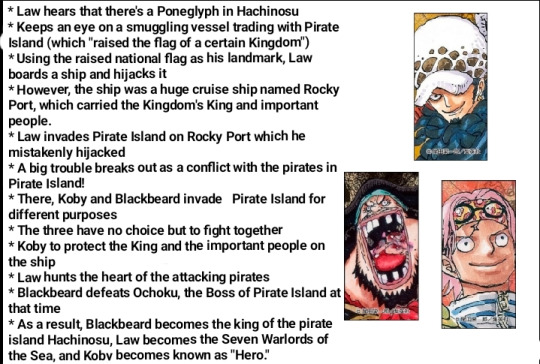
Just a clarification that "Hachinosu" and "Pirate Island", "Wang Zhi" and "Ochoku" are used interchangeably.
A common interpretational agreement is that Law definitely got onboard the wrong ship, and very likely the ship wasn't even going to Hachinosu. Artur's translation was incorrect, Law didn't board the smuggling ship. Pew's team updated their translation with Artur's version, even though their initial interpretation was right.
Law gained information that a smuggling ship heading to Hachinosu used a specific Kingdom's flag as their cover, and mistakenly hopped onboard a REAL ship belonging to that Kingdom- full of passengers and the King himself. The level of catastrophic clumsiness you'd expect from Luffy...

Man scratch that. it was clumsy even for Luffy's standard 😔
Another point to note, the term used to describe Law-Koby-BB combo was "共闘する形", so a combative pact is more appropriate than an alliance (同���) - which was used for Law's pact with Luffy, and later Kidd (vs Big Mom). Nothing unexpected though.
My entire timeline is people cracking jokes about Law's blunder so I'm cherry picking a few of them.

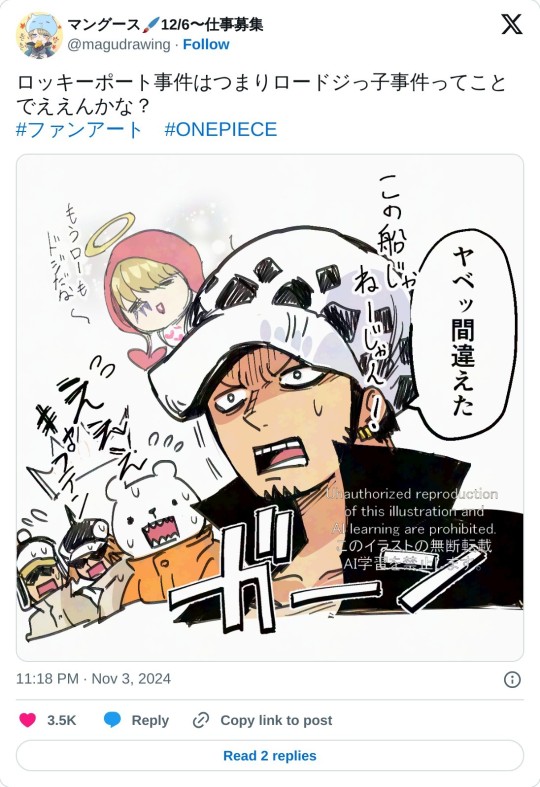
Law: Crap, I blew it up... This is the wrong ship isn't it? (Cora ghost: Gee, Law... you're also the clumsy type aren't you?)
Zen (@GOKUJOUNOMAGURO) (x). (x)
Blackbeard arrives on luxurious Saber of Xebec, Koby arrives on a naval ship, and Trafalgar Law is somehow on a passenger's ship.
No matter how big of a mistake I make in future, I might be able to console myself thinking, "well, even Law kun got on a wrong ship."
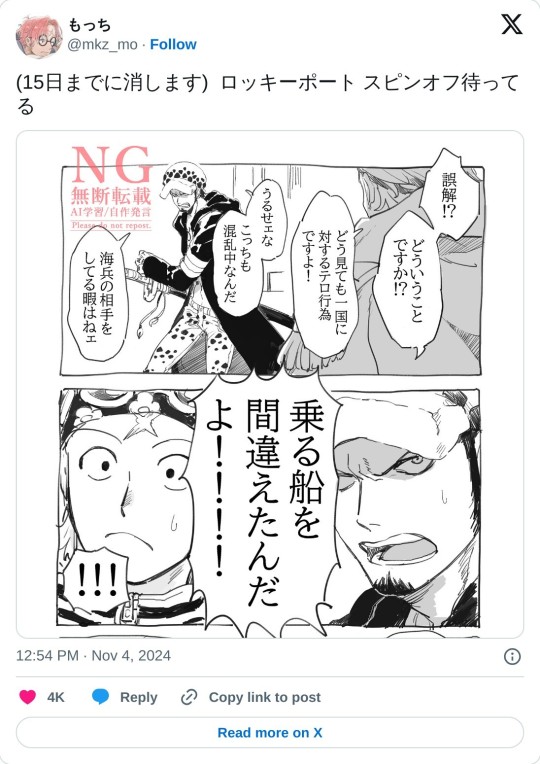
Koby: Misunderstanding? What do you mean? No matter how you look at it, it's an act of terrorism against a Kingdom!
Law: How annoying... I'm in a state of confusion myself! I've no time to deal with the marines.
I got onboard a wrong ship!!!
Koby (after having Alvida flashback): I see. What a disaster, my heart goes out to you. Let's call it a temporary truce and defeat Ochoku first.
Law: You're convinced?!
.
My favorite has to be this low - effort comic summarizing their understanding:
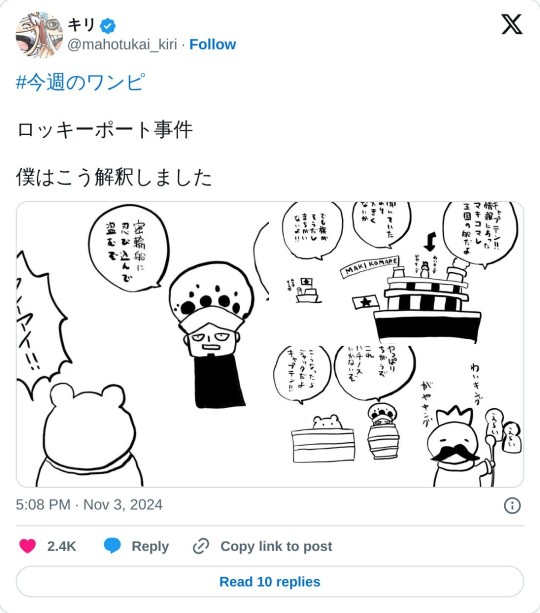
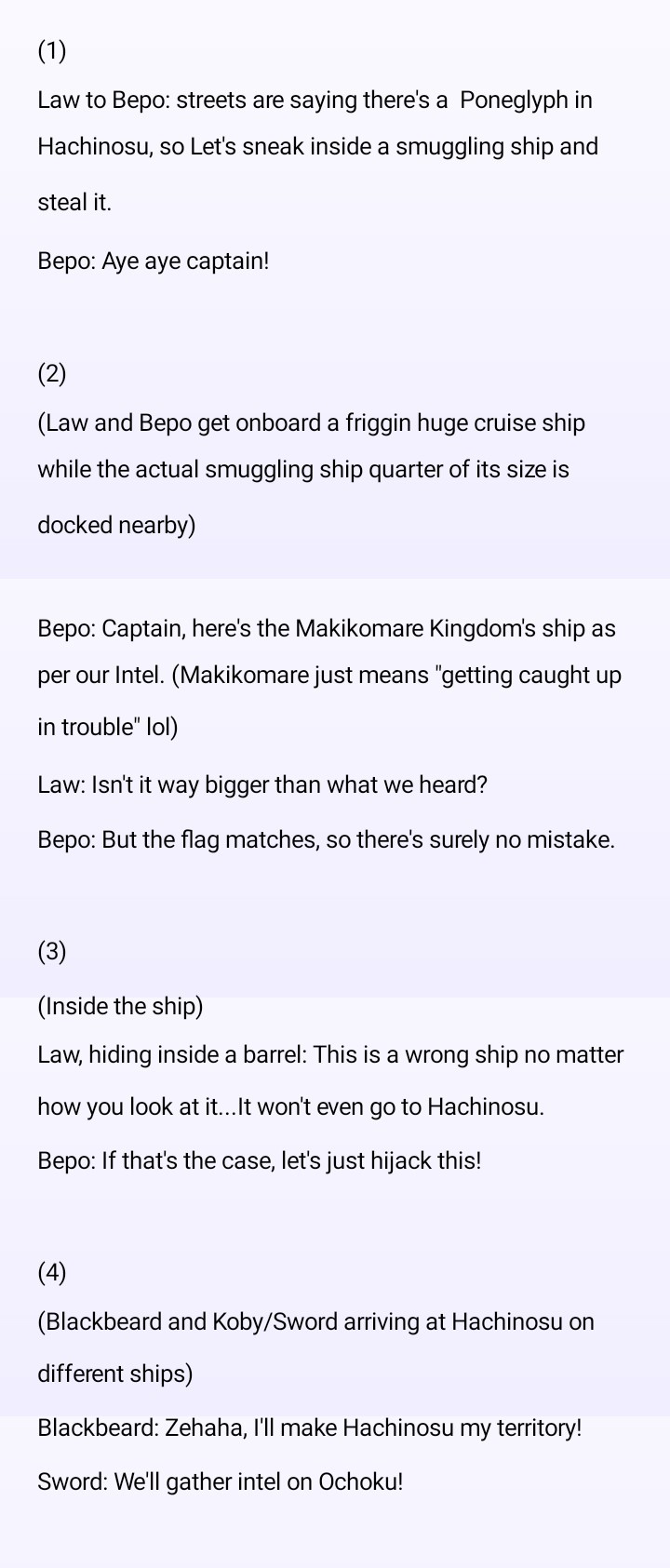
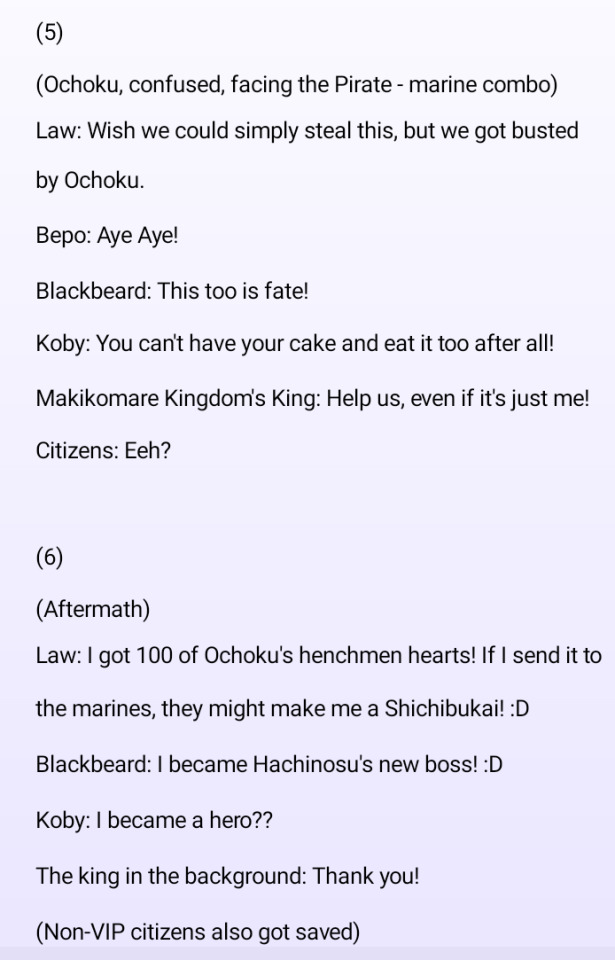
"Rocky Port spinoff" was another buzzing keyword last night, I hope Shueisha is taking notes.
#@y'all who HC law on crack pre timeskip - maybe you were onto something#he gave up on crack after this incident#btw what does oda mean law “hijacked the ship” and also “hid himself” - because you either lurk or you hijack?#I wasn't sure if it was just me but I've seen japanese twt wondering the same#also#maybe it's just my timeline but I haven't seen any discussion about law's quest for poneglyph#priorities...#one piece#trafalgar law#trafalgar d. water law#one piece koby#monkey d. luffy#one piece translations#stray translations#mine#donquixote rosinante#one piece Bepo#heart pirates#one piece meta
276 notes
·
View notes
Text
the significance of rook as a protagonist who is 'unable to be evil' is because the inquisitor can be. and hawke. and the warden, for that matter. in dai there are companion disapproval cutscenes for a reason: you have either fucked up so badly or killed so many people that they literally stage an intervention for you. rook, by contrast, is a tremendously appropriate protagonist for veilguard—not just because they’re handpicked by varric but because they are good. like their goodness is the point. it is the story.
and i get why some players would be upset by that and feel constrained by the moral paradigm the narrative inherently embodies. players like options. however, rook's goodness (in whatever capacity) does not necessitate that they're a bad/flat protagonist considering they have unique backstories which tells us about the quality and the context of that goodness. in my opinion, it's a natural byproduct of the overarching story of the dragon age games: yet another person thrust into a role and political position they did not ask for but must pursue for the greater purpose of all.
the thing about veilguard though is that no possible protagonist could be as bad or as evil as the evanuris (and by extension, the chaos ripping the veil down would do at this point in time), so to play as an evil!rook feels counterintuitive to the point of the game regardless.
if we WERE to get the option to play an evil!rook who, for example, supports the evanuris and blights the world alongside them, it just means there's no more world to play in. dragon age is over.
furthermore, there's no option to help solas bring the veil down because it is an evil option. it's not a dev mistake that rook doesn't get the opportunity to side with our favorite war criminal. to most thedosians, the end of the veil means the end of their life. solas is one of the most unreliable narrators in the series, so the idea that he has harm reduction measures in place is unmeasurable because he is a proven trickster. those who'd take the chance anyway would still be considered evil by all who are affected in the wake of it.
—and i agree that it would be fun! but it's not veilguard's story because the stakes are higher than they have ever been in previous games, and thedas needs someone else to save it once again.
#dragon age#veilguard#rook#datv#yet another braindump so obv not a thorough or comprehensive analysis#veilguard positive#dragon age the veilguard#just A Singular Thought okkkkk#da#mine#and listen i get it. i too wish we could have another quest like in hushed whispers but the thing is.... we HAVE hushed whispers#like we've SEEN it and that was just by corypheus' hand#imagine if solas had won? WHOOOWEEEEE#yeah yeah i know this argument has been beaten to death but i haven't dumped my thoughts out about it yet so here i am#screaming into the void. thank god for this website bc where else would i do this#meta analysis
349 notes
·
View notes
Text
七月Meta Quest+新遊戲:『Creed: Rise to Glory - Championship Edition™』與『The Last Clockwinder』
七月來臨,這意味著全新的Meta Quest+遊戲登場。現在加入Meta Quest+,首月免費體驗,之後每月僅需7.99美元。此外,購買全新512GB的Quest 3,還可獲得六個月的免費Quest+訂閱。 這個月,Meta Quest+為用戶準備了一對硬核遊戲:《Creed: Rise to Glory – Championship Edition™》和《The Last Clockwinder》。 在《Creed: Rise to Glory – Championship Edition™》中,玩家將沉浸在拳擊的激烈興奮中,體驗如大片電影般的戲劇性快感。作為一名有志成為拳擊冠軍的選手,玩家將在洛奇·巴波亞的指導下訓練,與熟悉的和意想不到的對手在動態競技場中對戰,建立自己的拳擊傳奇。 而在《The Last…
#Creed: Rise To Glory#Creed: Rise to Glory - Championship Edition#虛擬實境#虛擬實境遊戲#虛擬實境資訊#虛擬實境新聞#META#Meta Quest+#Quest 3#The Last Clockwinder#vr#vr game#vr news today
0 notes
Text
Every time I see a story, be it canon or fanfic, where Jason is like "wow my morals are kind of fucked up I should never kill again" I have to put it down, close the tab, ect. Because HE WOULD NOT FUCKING DO THAT. We're talking about Bruce's number one fan turned antagonist.
Do you not think he's maybe already considered such a thing?
The thing about Jason is that he's as devoted to his views and sense of justice as Bruce is, maybe with a little more flexibility (i.e. he's willing to temporarily stop killing if it's necessary for his overall goals where Bruce wouldn't be able to kill even if it would benefit everyone in the long run) and any run or story where he completely disregards his own moral compass and personal experience to follow Bruce's rules is just a disservice to his character.
His whole thing is that Batman's methods are ineffective and his unwillingness to either do what needs to be done or let someone else do so is a clear sign that he's not the hero Gotham needs. Jason genuinely believes everything he says about the system, and Bruce's ineffectiveness.
His crime lord era wasn't just a silly little thing he did to fuck with Bruce with the final confrontation as the REAL point of Under the Red Hood, he became a crime lord because he believed it was the best way he could help. The point of Red Hood is protecting Gotham, fucking with Bruce was just a bonus. Like the confrontation wasn't even initially planned, Jason haphazardly threw that at the end of his to-do list after he realized he couldn't just blow up the Batmobile.
Stop reducing Jason's motivations to "get Bruce's attention/make Bruce kill".
#dc#jason todd#bruce wayne#meta analysis#character study#fanon (derogatory)#this doesn't go for stories where he ditches his revenge quest because he realizes what he's actually been looking for is proof he's loved#however that's a whole other post#if you know me you already know my opinion on non dysfunctional batfam#which is to say I don't agree I want them to tear each other apart and I want Jason to dip as soon as possible
656 notes
·
View notes
Text
Just a reminder that Blitz has always been someone who takes care of others and builds them up.


Moxxie: "Do you remember what you said to me after my first day with the company?"
Blitz: "Not really."
Moxxie: "I remember. You told me I did a good job and that you were proud to work with me. I feel like you wanted to say something more judgmental, but you said that because I needed it."
I'm in the process of writing a post about Moxxie, and I stumbled on this conversation.
People are still coming out with "oh look, Blitz is finally learning to care about other people" takes. He's always cared. And he's always been good at being supportive (even if he's also shitty to the same people sometimes).
What he's finally learning is that people actually care for him back.

#I will never stop using this cute cute screenshot of Blitz's face when he's pushing the van with Millie#starting to believe he's valued- THAT'S the arc#blitz#blitzo#blitzo buckzo#my helluva meta#a side quest#helluva boss#helluva boss meta
178 notes
·
View notes
Text
The exact moment that Merlin tells Arthur he’s going to be a good king for the first time, Arthur looks like this.

That boy never had a word of praise growing up, he’s way too surprised by someone believing in him even after he “failed”/got injured.
Also, just that face on his face whenever he’s looking at Merlin.
It’s usually only there in softer moments in season 1. Like in episode two where Arthur believed Merlin about the snake shield, or in episode four where Merlin drank poison and Arthur defied his father and risked his life to save him, even against Gaius’ advice, Merlin’s uncle, because of how dangerous it was. Or the Lancelot episode. Or the Ealdor episode. Or the unicorn episode. You get the idea.
There’s a lot of these moments, but this one is kinda where I pinpoint Arthur realising how much Merlin means to him.
Also because in season 2, Arthur goes back to picking on Merlin and trying to keep him at arms length. I think he got scared of his feelings towards Merlin - whatever you want to say they are, romantic, platonic, or otherwise - and tried to distance them. Cedric showing up was just convenient with the timing before the whole Sigan thing. It gave Arthur a chance to panic, push Merlin away, and then reaffirm his fears until later on in season 2.
This scene is also the reason why Merlin not joining Cedric/Sigan with the whole “It doesn’t matter how Arthur treats me, he’s a good man” thing makes sense. This is the last time they interact in season 1 and it wraps up everything they’ve been through up until this point really well.
I can go more into how and why the timeline of season 1 and 2 are really important to how the show was going to progress if people want that. The character development in BBC Merlin is brilliant. It’s not as good as atla but not even its own live action could compete so that’s fine. Honestly, I think Merlin is as heartbreaking as it is because it’s more believable than a happy ever after, because of how things were set up in the first two seasons.
Anyway, I just feel like I’m rambling though so I’ll leave this here before the coherency leaves entirely.
#bbc merlin#merlin#merlin emrys#arthur pendragon#merlin bbc#merthur#yearly merlin rewatch#merlin rewatch#i’m going feral#merlin meta#season 1 episode 13#the questing beast#thoughts#ramblings#i’m bad at tagging#i don’t know what i’m doing#merlin x arthur#merlin and arthur
189 notes
·
View notes
Text
The improvement in alhaitham and kaveh’s relationship post-parade of providence is TANGIBLE!!! I’ll talk about things of note from cyno's story quest 2 before posting my deep diving into what this all means for them <3
Firstly, kaveh’s appearance in the tavern being to pick up his order of wine, only to show his parting from the traveller, to ask lambad whether his order includes ‘the coffee beans’ – which is a direct reference to his 2023 bday letter in which he and alhaitham test coffee beans together for his birthday, and now, canonically, this can be observed as a common practice for the two of them – this is symbolic of domesticity, as the two only do this outside of the player’s sight, confined to the privacy of their home.
Alhaitham’s introduction within this quest is waking the traveller up (to which they ignore haikaveh and honestly, valid) due to their discovery of the temple of silence – and I think this is a little self-indulgent on my part, but I think it’s Interesting that tighnari mentions that the tent paimon picks is prone to being stumbled into by ‘sleepwalking fungi’, which prompts cyno to encourage the traveller to safeguard their tent with a weapon. Paimon comments on the improbability they will be attacked or woken up by uninvited guests, and lo and behold, haikaveh turn up – implying they are the sleepwalking fungi? it’s reminiscent of alhaitham’s story quest where alhaitham questions if kaveh would devolve into a fungus, to which kaveh replies he would be a fungus with empathy… if this is at all deliberate, it’s a really cute parallel!!
The completely unnecessary flashback scene in haikaveh’s house, it’s purely there to showcase the development of their relationship - there was no need to animate something that could have been exposition?
(The scene is established with alhaitham reading a book with kaveh offscreen preparing snacks and wine for the two of them, and when kaveh enters, alhaitham puts the book down and directly engages with kaveh’s conversation with a CRIMINAL smile on his face. Kaveh continues the conversation whilst sitting on the table, which shows his comfort and familiarity within the house? With alhaitham? This is also heightened when he leans back on the table during the conversation. Alhaitham is shown thinking about the case and kaveh offers to draw the emblem on the paper of the extortion letter – when kaveh turns his back to do so, their conversation is halted, and only then does alhaitham bring out the book again, but there is a deliberate still on his face as he looks UP from his book to look at kaveh sketching? There was no need for this.!!.>!!!
When kaveh returns to show alhaitham the sketch, the book is gone again, and the previous distance between them is closed – kaveh sits on the table in front of alhaitham, and this creates an intimacy as the two directly face each other. this couldn’t have been established solely by sitting next to each other on the divan. Alhaitham smiles at the sketch and notes that he recognises it, to which kaveh smiles(!!!) at and questions this. Alhaitham recognises the ARCHITECTURAL signets within the symbol, which not only relates back to their joint thesis but also their character concepts as mirrors, as alhaitham appropriates kaveh’s architecture, and kaveh has appropriated alhaitham’s language – which suggests a balance between the two.)
Alhaitham and kaveh working together to identify the emblem to be that of the temple of silence acts as the catalyst for the chain of events within the story quest
Kaveh quipping at alhaitham keeping the salary of the acting grand sage – but with no animosity behind it!??? his last expression during this dialogue honestly looks exasperated but in a fond way…. Im ill….
Alhaitham and kaveh looking at each other when discussing how the case doesn’t make sense… just alhaitham and kaveh looking at each other and deliberating over the other’s thoughts… finally… listening to each other and working together…
The additional (HIDDEN) scene in the house of daena where they begin researching, with alhaitham commenting that he will look for texts pertaining to the temple of silence, to which kaveh says it will take too long, and then agreeing to help alhaitham, without alhaitham having to ask, which demonstrates their improved synergy. Kaveh asks alhaitham how to teach him in gaining information on the sly, to which alhaitham DOES but teases him about it at the same time, but so fondly... I would say this scene mirrors the additional scene in the archon quest, with kaveh talking to alhaitham by the bookshelves and accusing him of stirring trouble in sumeru, while alhaitham appears bitter that kaveh was in the desert during the overturning of the sages. There is a distinct shift in their relationship here – in the past, the two missed an opportunity to work together, whereas here they are voluntarily banding together (which ive discussed here)
COFFEE MENTION 2! Alhaitham mentions how he wants to drink coffee, to which kaveh laments that he wasn’t able to bring any from home. When using nahida’s skill on them, alhaitham can be seen thinking about wanting coffee,,, and then kaveh is thinking about how to get to coffee to them by using mehrak. Even their thoughts are working in tandem??? This contrasts with their individual thoughts in alhaitham’s story quest, where kaveh is thinking about how alhaitham was being vindictive towards kaveh drunkenly writing on the bulletin boards, and labelling alhaitham as having ‘terrible thoughts’, all the while alhaitham is thinking about how dusty the bookshelves are… the progress is STARTLING
When the group reconvene in the house of daena, alhaitham and kaveh have progressed their research on their own accord and based on what naphis has told them. When explaining, the two complete each other’s sentences, and this rounds off with alhaitham conjecturing that the goal of the assailant was to get cyrus to see the letter, which makes kaveh realise cyno’s motivations, and for alhaitham then to ascertain cyrus’s whereabouts. Naphis then assigns alhaitham and kaveh to be in charge of the house of daena, to which they both agree, and alhaitham… smiles? With so much pride? WE GET IT YOU’RE WORKING TOGETHER!!!! SHUT!!!
Cyno and tighnari mention TWICE how essential it is that kaveh and alhaitham worked together, with mentioning how imperative it was that kaveh spotted the emblem and that alhaitham connected it to the temple of silence, and then how alhaitham gave tighnari advice on desert cultural traditions, which aligned with kaveh’s experiences with desert tribes, which gives tighnari the idea to turn the tables on the temple of silence
Returning to the house of daena, cyno highlights that it is STRANGE that kaveh and alhaitham are working together, in that he is surprised to see them studying together? This draws further attention to the unlikeliness of the situation, and that this MEANS something in regard to their relationship!
Kaveh stressing about having to pack away their copious research materials, only for alhaitham to reassure him that there’s ‘no rush’… so gentle
Cyno and tighnari thanking alhaitham and kaveh for WORKING TOGETHER as it allowed them to find a swift and good outcome
COFFEE MENTION 3! Cyno offering to take everyone for coffee, which alhaitham agrees to, and kaveh agreeing to, although he says that because of the last few days, he’ll order something different (confirming that alhaitham has the caffeine tolerance of a tank and kaveh gets caffeine jitters thank u @ hoyo). On the table the two were studying, two trays of a pair of coffee cups and coffee brewers can be seen… the same that can be seen in their house??? Meaning they brought their domesticity to the library with them… and they also sat across from each other, which reminds me of how kaveh sat in front of alhaitham in their house, rather than next to him…
Kaveh and alhaitham sitting next to each other in the café <333
KAVEH CALLING THE HOUSE ‘HOME’ TO ALHAITHAM??? IN FRONT OF THEIR FRIENDS?? This is a big contrast to kaveh in a parade of providence and alhaitham’s story quest who hated to having admit such a thing. And then alhaitham AGREEING that the house is ‘HOME’, and again their thoughts align with ‘my thoughts exactly’. Alhaitham and kaveh leaving together, to the house of daena (where they met, where it ended, and where they have been shown to bond together in this quest) and then back to their shared ���home’... oh......
from this, kaveh no longer seems defensive or reserved in front of alhaitham, and makes no notion of criticising alhaitham, offering to help alhaitham into researching, and even asking alhaitham to teach him something he deems as a useful skill which he lacks. he openly takes onboard alhaitham's views on the case and responds in kind in order to come to a resolution. he actively makes time in his day to spend with alhaitham, seen in them enjoying snacks/wine/coffee together and talking about his day. he describes the house they share as a 'home', which, for kaveh, is imperative to his character due to his loss of family (which ive posted about here)
alhaitham, similarly, is less critical of kaveh, and this is because a seemingly resolved miscommunication between them. he is receptive to, and encourages, kaveh to communicate with him when it comes to things that kaveh believes to be noteworthy, actively focussing solely on kaveh, rather than his book, when kaveh initiates conversation. he equally seems to enjoy this time spent with kaveh, as he is seen nowhere else but by kaveh's side during this story quest, wanting (kaveh's) coffee within the library which would establish a familiar and domestic setting elsewhere outside of their home. when leaving his group of friends at puspa's, saying that it's him 'done for the day', he retreats with kaveh, back to their shared 'home'
overall, alhaitham and kaveh's relationship has improved VASTLY since their first interaction in the archon quest. there seems to be an understanding between them now and this results in comfort and familiarity where they used to be miscommunication and snipes, and there appears to be a balancing of their viewpoints as they appreciate in the other what was once viewed as mirror opposites never to align, being that of language and architecture. a sense of harmony(?) balance(?) has been established here, and this is shown to be the ideal course of their reconciliation. im so weak......
#haikaveh#kavetham#alhaitham#kaveh#cyno story quest spoilers#alhaitham x kaveh#kaveh x alhaitham#haikaveh meta#genshin meta#the table that kaveh perches on and coffee beans are now canon haikaveh motifs#we have keys the house the table and coffee beans?? all so domestic#never getting over the flashback scene in their HOME just to show the player their progression#WHAT DID THEY TALK ABOUT EXACTLY TO GET TO THIS POINT#OR WAS IT JUST A NATURAL SOFTENING AFTER A PARADE OF PROVIDENCE?#as in kaveh readjusted his view of alhaitham and softened towards him outwardly#which resulted in alhaitham recognising a shift had occurred and responded in kind?? SO MANY QUESTIONS
455 notes
·
View notes
Note
When do u think Natsu actually realized that he fell for Lucy and i know he treats her differently but can u give moments where it's initiated from his side?
This is going to be a long post so buckle up!
Okay, first of all: the Phantom Lord arc. Though I don't think he fell in love with her at that point of time, I think it was the events that seriously solidified his partialness to her. I'd go into detail but I can already feel a long post incoming, so I'll keep it short: Lucy telling Natsu that she loves being a Fairy Tail wizard, while crying over the fact that she didn't want to leave ↓

After just trusting her life in Natsu, jumping from an insanely high tower, with a mere belief that maybe she had heard him in the distance – I think it struck a chord with Natsu. Like, it would be normal to cry after a fall like that, but Lucy wasn't concerned about that aspect. Her head and heart was all about the guild, how she didn't want to go, and that resonates with Natsu. Natsu's entire life at that point is 1) Finding Igneel, and 2) being with/protecting the guild.
Then I'd say it's a pretty gradual build in their relationship. They go on a lot of missions, hang out together, and just in general spend a lot of time connecting. There's some Natsu-saves-Lucy, some Lucy-saves-Natsu, some hand holding (tenrou arc I won't forget about that, thank you anime team for adding that scene), and then comes the next pivotal moment. GMG arc and the dragon festival that follows.
By then I'd say Natsu and Lucy are very much in this friends-with-emotional-benefit zone: much more than friends, absolutely not yet lovers. But with Lucy's near-death experiences in her battles, Natsu has to refrain himself from getting involved each time Lucy gets beaten up - he becomes helpless, and the worry that's sowed inside of him gets watered each time Lucy still puts his faith in him, still trusts him to come out a winner. That entire section when Lucy's in the infirmary and she tells Natsu that her entire being trusts that Natsu can do anything, I think that's when Natsu falls in love.
Now wait!! He still doesn't quite understand that he loves her. But he understands that his feelings for Lucy are more tender than any other feelings he's ever had. He treasures her in a new, heavier way. She's become precious to him.
Precious. Where have we heard that... oh >:) ↓
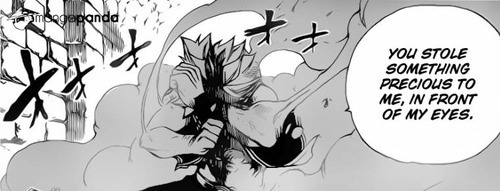
Now the Dragon Festival was LETHAL in a trillion ways, but especially for nalu fans. The whole Future Lucy plot and the forehead touches and the Future Natsu and Future Lucy fighting in a wasteland moments and the Natsu skipping the final GMG match to save Lucy. And of course. Future Lucy dying. It's not the first time we see Natsu get so heavily affected - it happened in the tower of heaven, when Erza was ready to give her life up. But it is the first time we see Natsu see a friend die. Like, a team mate, someone who he's responsible for bringing to the guild. And after the whole GMG conundrum? Had a single more bad thing happened Lucy during the dragon festival, he’d probably turn into a demon right there and then. Dare I even say: their relationship was the strongest at this point in time.
After the GMG and the Dragon Festival, we get the Sun Village arc (I don’t like the Eclipse celestial spirit arc so I’m not counting it, same with Key of the Starry Sky arc — technically some nalu moments but not exactly building imo) and then another big one: Tartaros. Ooooh brother, THE best arc of all times, wish Mashima knew how to replicate it. But alas, he doesn’t.
The Tartaros arc isn’t exactly a pivotal moment where Natsu “falls in love” but rather an important aspect to understand his later actions. Like this guy goes through some pretty grusome stuff, learns a lot of complicated, bad things about himself, and finishes off the arc with losing Igneel — his father that he's spent ages searching for. Natsu's entire life is turned upside down, so he decides that he has to become stronger: cue, he heads off for a year to train.
His time away isn't very elaborated on — not from Natsu's viewpoint or Lucy's. But I think it's understood that he chose not to bring along Lucy because she could be put into danger too much for him to be able to concentrate on building his strength: he knew his training would be dangerous. During this time we also have the Gildarts-scene in chapter (idk i can't be bothered to look it up but y'all know the one ↓) which is kinda debated on — who was Natsu talking about here?
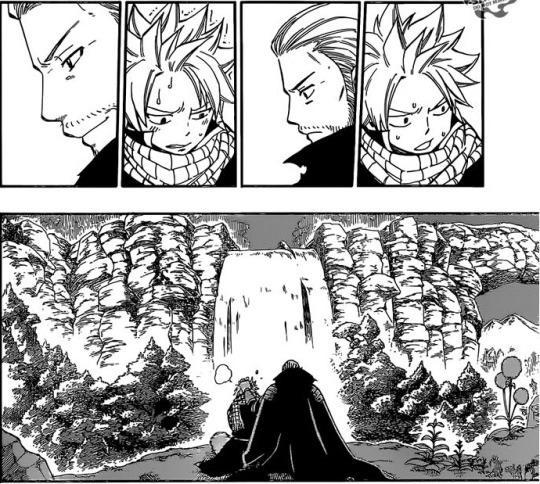
I'm still not certain on if it was a heart to heart on the Igneel-matter, or if it was about his guilt of leaving Lucy behind, like many theorise. I'm not even certain that it's limited to one of them — he could be talking about both. But at the very least, this entire year was one of those "distance makes the heart grow fonder" moments for him. He wanted to get back to his normal life with Lucy so bad. After all, it wasn't like him showing up at the GMG was in order to meet Lucy — had he wanted more training after that, he'd head off again, but I don't think he could physically bring himself to do it, even if it hadn't turned out that the guild had disbanded. Though that's just me speculating a bit.
And about the guild disbandment: oh jolly, he was not happy. He had finally taken the step to grow stronger to protect everyone in his beloved guild, and here Makarov went and disbanded it? Leaving Lucy completely alone? Lucy, who once jumped from a hella high tower because she was just so devoted to stay in the Fairy Tail guild? Yeah, I think that broke him a little. At this point there was just so much guilt involved around his whole relationship with Lucy, because now he had put her through so much pain only because he brought her to Fairy Tail that day in Hargeon.
The next arcs I'd say Natsu's trying to spend his time redeeming himself for the countless things he's done bad (getting the guild back together, just generally staying by Lucy's side as much as possible). And naturally he keeps getting hit by challenge after challenge (it's not easy to be a book written by his immortal brother, yk?). And it's even harder to watch Lucy die again, this time for real (he thinks bc he's stupid and also has a tumour that's nothing less than a ticking bomb) (give this guy a break lol).
Anyways: Lucy's death nr2. Natsu can't live a life without her. Now I know — he still doesn't quite understand that it's romantic love, but I think he does understand that it's pure love. No matter if kissing and reproducing was involved, all he knew was that a life without Lucy is completely unimaginable, so blinded by rage he becomes and decides to decapitate everyone in his way (sorry about that Gray).
The last couple of moments I'll go out of my way to mention as signs of love is 1. when he's won over Acnologia and falls towards Lucy, crazy relieved, saying "I'm home", 2. Gajeel pointing out Natsu's crush on Anna, Natsu basically saying "oh that's why I like Lucy so much" (I embellished it lol) and 3. "We're still gonna be together from here on out, right?" yeah that man won't ever leave her. Ever. It's just not an option.
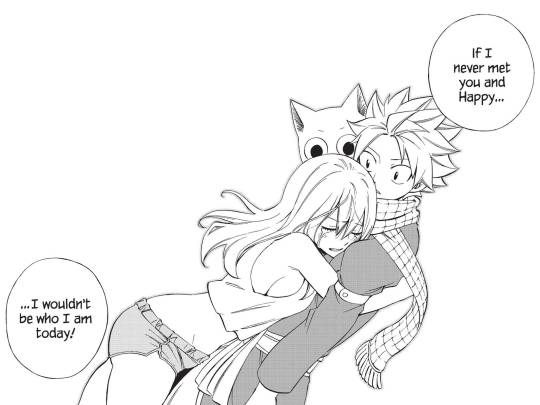
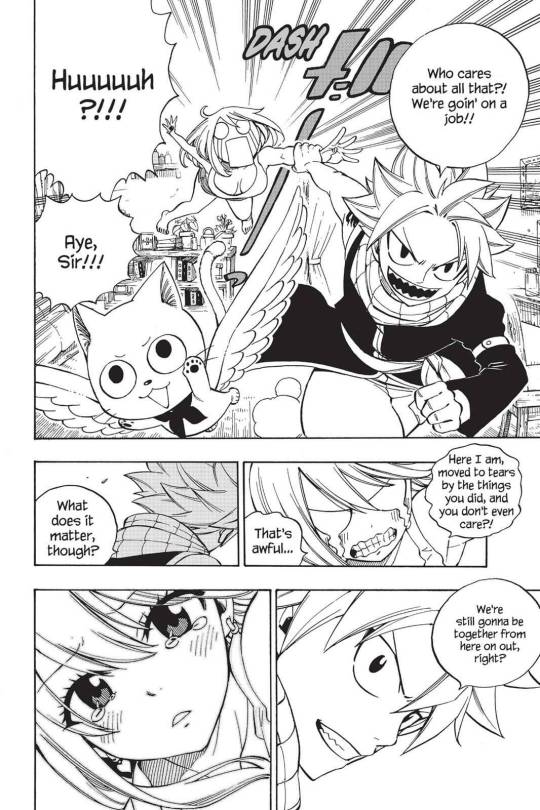
Now since I've only talked about specific moments, here's what I have to say about his relationship with her in general:
Throughout the main plot line, we also see a shift in Natsu's behaviour. Someone here on Tumblr pointed out that Natsu always finds a way to shield Lucy if something unexpected happens, after not being able to shield her from Future Rogue. There's also the small detail of the order he calls out to people - it goes from being pretty random, to Lucy almost alwyas being on the top of the list: likely because she's always on the top of his head. And in general I'd say that Natsu initiates (i'm adding this entire paragraph bc i realised that you asked about when Natsu initiated stuff, more than when he fell in love lol) almost all of their interractions. It's Natsu who wants Lucy to join Fairy Tail, to form a team, he's the one who enters her apartment constantly, he's always searching her out - his interest in her is at a constant high so we never feel like we get "moments" that he's paying her extra attention. He has one setting, and it's "Lucy" cranked to the max. Lol.
I could also add some HYQ moments to the mix here, but they've been few and far inbetween, and also mostly played off as jokes, so I can't really consider them as moments when Natsu initiates his love. I guess his jealousy can be considered a sign? And when (spoilers from the manga) he runs around to protect her/save her from creepy-freaky-jail (the only one who made it freaky was him, with those wild fantasies lol). Maybe I need to jog my memory a bit, but so far there hasn't been any non-pervy nalu moments initiated by Natsu in the HYQ, aside from jealousy-chap. Sadly.
Hope this gave you the answer you were hoping for! Sorry it took so long, I started writing on it and realised it would be a bible so I put it in my drafts to fetch some pics to make it less wordy, and then I forgot about it, lol. But here it is!
#fairy tail#lucy heartfilia#natsu dragneel#nalu#answering stuff#fairy tail 100 years quest#fairy tail nalu#hyq#nalu fairy tail#ft nalu#ft analysis#fairy tail analysis#fairy tail meta#ft meta
202 notes
·
View notes
Text
I feel like the problem with “this character is useless” is because of how the Fairy Tail Guild cares not for power or strength.
In face, Saber Tooth was made as a foil to Fairy Tail with this idea in mind. Fairy Tail doesn't care if you can punch evil really hard so long as you're a good sport and can do an appropriately ranked missions in your own way.
Yes, the narrative often thrives on nasty villains who can punch good really hard but still, it feels like Fairy Tail was made to piss Power Scalers off.
If it was, good. Hell, what was Laxus's tournament if not a callout on how strength didn't matter to the guild and he was being insecure if anything.
Early Lucy might not get in enough 1v1s or be able to punch real hard. She's still Fairy Tail.
Early Wendy was more often a crybaby and a klutz. Still Fairy Tail.
Hell, Happy not being with them would've left them up a creek. He might be behind Panther Lily and Carla in not transforming but his aero magic goes a long way to fly a friend out of danger.
#fairy tail#fairy tail meta#hiro mashima#manga#anime and manga#anime#ft 100 years quest#fairy tail 100 years quest#power scaling#anti power scaling#lucy heartfilia#natsu dragneel#gray fullbuster#erza scarlet#laxus dreyar
96 notes
·
View notes